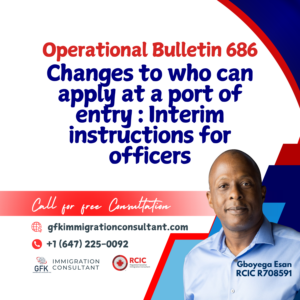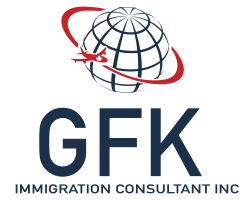
This section contains policy, procedures and guidance used by IRCC staff. It is posted on the department’s website as a courtesy to stakeholders.
Operational bulletin 686
Changes to who can apply at a port of entry: Interim instructions for officers
| Effective date | Expiry date, if any |
|---|---|
| Immediately | N/A |
Details
The intent of this bulletin is to clarify new restrictions to flagpoling at ports of entry (POEs).
On December 23, 2024, the President of the CBSA signed a designation package that limits certain services at Canada’s POEs in accordance with their delegated authority under section 26.1 of the Immigration and Refugee Protection Regulations.
Effective December 24, 2024 at 00:01, the President has specified that POEs will no longer receive applications for work permits or study permits from foreign nationals who meet the definition of flagpoling.
Background
The designation package specifies that the following immigration services will not be provided to foreign nationals who meet the definition of flagpoling:
- collection of biometric information under section 12.3
- reception of an application for a work permit under subsection 198(1)
- reception of an application for the renewal of a work permit under section 201
- reception of an application for a study permit under section 214
- reception of an application for the renewal of a study permit under section 217
Operational bulletin 686
For the purposes of the designation, “flagpoling,” is defined as:
when foreign nationals, who hold temporary resident status in Canada, leave Canada and after a visit to the United States or St. Pierre and Miquelon, re-enter for the purpose of obtaining immigration services at a port of entry including work and study permits.
The designation specifically exempts some groups who otherwise meet the definition of flagpoling. Those exceptions include:
- Citizens and lawful permanent residents of the United States of America
- Professionals and Technicians seeking to perform work pursuant to a Free Trade Agreement (FTA) as a:
- Professional pursuant to the agreement between the United States of America, the United Mexican States and Canada (GCMS administrative code T36)
- Professional pursuant to the Canada-Chile Free Trade Agreement (GCMS administrative code F22)
- Contractual service suppliers or independent professionals pursuant to Canada-Korea Free Trade Agreement (GCMS administrative code F32)
- Professional pursuant to the Canada-Panama Free Trade Agreement (GCMS administrative code F42)
- Professional or technician pursuant to the Canada-Colombia Free Trade Agreement (GCMS administrative code F12)
- Professional or technician pursuant to the Canada-Peru Free Trade Agreement (GCMS administrative code F52)
- Spouse or common-law partner of an applicant described under paragraphs (iii), (iv), or (v) above
- International truck drivers who hold a work permit, are required to depart Canada for the purpose of their employment and held maintained status as a result of applying for renewal prior to departure
- Those with a pre-existing appointment booked with the CBSA for permit processing as of the date that the designation comes into effect
Interpretive notes
- The designation package only applies to foreign nationals who are flagpoling as defined above. It does not apply to any other traveller cohort.
- The reference to “immigration services” in the definition does not include visitor records (VR) and temporary resident permits (TRP).
- Foreign nationals who hold temporary resident status in Canada and are provisionally approved to work or study by IRCC will no longer be able to obtain their permit by flagpoling.
- Officers are reminded that TRV required foreign nationals who are in Canada without temporary resident status are ineligible to apply for a work or study permit by flagpoling as they would not be considered TRV-exempt under the provisions of section 190(3)(f) of the Immigration and Refugee Protection Regulations.
- Border services officers (BSOs) should be cognizant that the admission of a traveller on initial entry without processing a request for a work permit or study permit (where eligible) has consequences for the applicant, as it would now preclude them from flagpoling in the future to obtain their permit.
- As a result of these changes, some foreign nationals may find themselves outside of Canada with limited options. If an officer is not designated to accept an application under R26.1, this does not automatically make the applicant inadmissible to Canada. An officer must complete a full assessment, consider all of their options and make a decision. If an officer chooses to facilitate, they must be satisfied that the person will comply with the imposed general temporary resident conditions. As always, applicants should be fully counselled regarding the conditions of entry.
- BSOs may also choose to issue a temporary resident permit (TRP) to inadmissible foreign nationals should they feel it is justified in the circumstances. However, a TRP cannot overcome where an application may be accepted, in other words, that the POE is not designated to receive an application from a foreign national who is flagpoling.
- If there is a request for either a permit that was not issued on initial entry, or the correction of a permit that was issued, due to an error made by the CBSA, this request should not be considered flagpoling. The port of entry should review the request to determine if the permit can be issued or corrected on a case-by-case basis.
- Biometrics collection is only restricted for those who are making an application and who meet the definition of flagpoling. Collecting biometrics in enforcement cases is not subject to this restriction. In other words, biometrics should be collected as per the applicable policy when enforcement action occurs.
Note: A foreign national who flagpoles is seeking entry to Canada. When the foreign national’s application cannot be processed, officers are reminded that, if the applicant is authorized into Canada, as per subsection 183(2) of the Immigration and Refugee Protection Regulations, the automatic authorized period is 6 months unless specified by an officer. For greater clarity, if a BSO does not stamp the passport and manually note the date to align with the existing permit “must leave by” date, the individual is authorized to remain in Canada for 6 months from their last entry.
Actions required by border services officers
Officers should familiarize themselves with these instructions.
Actions required by superintendents
Superintendents and managers will ensure that the above instructions are implemented immediately.
Operational bulletin 686
GFK Immigration
Gboyega Esan RCIC R708591
Phone: +1 (647) 225-0092
#studyincanada #studyabroad #canada #studyinuk #studyinaustralia #ielts #studentvisa #studyinusa #studyvisa #immigration #canadavisa #visa #education #internationalstudents #overseaseducation #study #canadaimmigration #highereducation #studyoverseas #canadastudyvisa #immigrationconsultant #australia #university #workpermit #canadapr #expressentry #studyineurope #immigrationcanada #studyingermany
